社交应用《Music Pets》或创新数字音乐销售模式
今天的小孩都有可能成为明天的音乐爱好者,他们也会像在《Farmville》和《Penguin Town》等虚拟世界中购买虚拟商品一样,在游戏中购买数字音乐内容。
Conduit Labs(游戏邦注:音乐社交游戏公司,现已被Zynga收购)的Facebook应用《Music Pets》虽然走的是可爱路线,但却有可能影响未来的音乐内容搜索和销售的方式。
在《Music Pets》中,玩家通过训练自己的虚拟宠物,让它喜欢上玩家本人所喜欢的音乐,然后通过使用游戏积分“派遣”宠物去寻找更多自己喜爱的偶像歌曲,并添加到自己的音乐收藏夹中。这听起来也许有点傻气,可是这种卡通风格的虚拟世界却包含现实世界音乐体验的各种元素:玩家能够通过推荐功能了解更多好音乐,也能按照自己的喜好选择并收集音乐,同时他们还能到好友的“房子”里播放自己音乐收藏夹中的曲目,但玩家必须赢取更多游戏积分才能享受这些体验。
与其他同类游戏相似,只要玩家能够在宠物训练机制下反复添加歌曲,就能够为其宠物获取任何免费的虚拟商品和音乐。这种风格有点像Plinko机会游戏,支持玩家向乐队的名称字母投射弹珠。玩家如果不想花费大量时间晋级,那就得付钱加速游戏进程,而在其他情况下,多数用户并不乐意为数字音乐掏钱。
Conduit Labs把《Music Pets》的部分收入支付给唱片公司,而这些唱片公司再把所得收益分配给了艺人和发行商。莫非在虚拟宠物世界里这些毛茸茸的卡通人物,真的能够战胜游戏产业中的一些重量级角色而吸引更多少儿游戏玩家购买音乐?
自从《Music Pet》在Facebook发行一个月后,该应用已经吸引了100多万名用户。随后Conduit Labs便与世界上最大的唱片公司——环球音乐集团签约,以《Music Pets》,《Loudcrowd》(游戏邦注:音乐虚拟社区网游,于去年在美国SXSW中首次亮相)和《Super Dance》提供更多音乐源(目前Conduit Labs已经和Beggars Group, Domino,Downtown和Modular等独立唱片公司建立了合作关系)。考虑到用户需要花费精力和时间去获取音乐,《Music Pets》并未像其它游戏那样明确公开数字音乐的价格。
Conduit Labs创始人Nabeel Hyatt表示:“公众对于音乐价值的理解是错误的,而且对这些音乐的实际售价也没有多大关系。所以我们希望能够通过提供音乐,使玩家感受到游戏的趣味性和社交性,并以此获取最大的收益。”
如果你认为成年男性和女性使用可爱的小“宠物”寻找并收集音乐是件荒谬的事,那说明你还不知道Jesse Schell(游戏邦注:Schell Games首席执行官和创意总监)在DICE峰会上发表的谈话。他宣称未来任何事物都将以游戏的形态展示出来。有人会认为这种社会极其可怕,就像是失去人性的奥威尔社会;但同样也有人认为这种社会中的人类会变得更加有趣。所有的观点都取决于你如何看待游戏。
在现实世界中,人们经常会通过朋友推荐而了解到一些新音乐,然后找到这些音乐试听,并决定是否要购买它。当人们购买了一张唱片时,可能会反复播放并欣赏,同时偶尔也会为朋友播放这些歌曲。
《Music Pets》这款游戏正印证了以上所有的说法,只是它把这些行动以游戏形式体现出来而已。假如Schell所言无误,像《Music Pets》这各类型的游戏也许将成为吸引少儿用户购买音乐内容的一个重要平台。
以下是《Music Pets》的游戏机制解析:
我的虚拟熊猫到市长家为他播放音乐。你可以与现实中的朋友一起听音乐。
你可以花费5至100美元购买虚拟货币,或者也可以在游戏中赢取这些货币。你可以使用这些虚拟货币去购买唱片。
你可以在邮局给宠物买食物。在虚拟世界里,每一名玩家都可以在虚拟网络中下订单买东西。
现在我的宠物熊猫上升到了第二等级,即它能够食用我在邮局买的食物,并通过这些食物恢复能量。
现在我可以训练宠物熊猫并准备“派遣”它外出寻找新音乐了。
训练熊猫的过程很有趣。通过投入弹珠击中乐队名称的所有字母,可以训练宠物对音乐的敏感度。
通过训练我的宠物,让它了解我所喜欢的音乐。通过下一张截图能更好地了解如何训练宠物。
我不喜欢Puddle of Mudd的歌,但是却不会因为我的宠物推荐他们的歌而责备它。你播放的音乐越多,宠物推荐的音乐内容就越合你的口味。
玩家播放音乐的次数越频繁(或花钱越多),宠物就能够找到更多音乐。
我的宠物在“市长”家为他播放音乐。在游戏中宠物是每一个人的朋友,但是同时玩家也能够在游戏中与现实世界的其他玩家交朋友,并与他们一起听音乐。
我的音乐收藏夹中只有一些音乐,而且每次听音乐都必须耗费宠物的能量。亚马逊的音乐链接推荐我使用MP3,不过手机版本的游戏却并不需要这种服务。
为了逗乐宠物,我必须为它播放一些音乐。它了解了我播放了什么音乐后便会出去寻找更多新音乐让我试听。(本文为游戏邦/gamerboom.com编译,如需转载请联系:游戏邦)
Virtual Worlds, Real Money: Can Social Games Solve Music’s Woes?
By Eliot Van Buskirk
Music fans of tomorrow are kids of today, and the way they pay for digital content is through virtual worlds like Farmville and Penguin Town, which turn the acquisition of virtual goods — and digital music is nothing if not a virtual good — into a game.
Conduit Labs’ Music Pets app for Facebook may look cute, but it could have tangible ramifications for how music is discovered and sold in the future.
The goal of Music Pets is to entertain a virtual pet by training it to like the music you like, then using points to send the pet out to find more music to add to your collection. It sounds silly, but this cartoon-ish virtual world includes every element of the real-world music experience: getting recommendations, deciding whether you like songs, collecting music, and going over to your friends’ “houses” to play songs from your collection, which, as with just about everything else, requires that you expend points.
As with similar games, you can get everything you want for your pet and your music collection for free, so long as you have the time to add them to your pet’s training regimen by engaging in repetitive, somewhat amusing activities, including a Plinko-style game that has you trying to bounce balls onto all of the letters in a band’s name. Powering up for more points without spending lots of time requires that you pay up in real money, which is something many people simply don’t do for digital music in other contexts.
Conduit Labs passes on a percentage of revenue to labels, which then pass some of that along to artists and publishers. Is it possible that little furry cartoon characters from Tamagotchi-land will succeed where industry heavyweights have failed: in convincing kids to pay for music?
So far, the Music Pet Facebook app has drawn over a million users since its launch about a month ago, and the company recently inked a deal with the biggest record label in the world, Universal Music Group, to complement its healthy selection of independent labels (Beggars Group, Domino, Downtown and Modular) in Music Pet as well as its other games, Loudcrowd, which launched at SXSW last year and Super Dance. Rather than selling music at a specific price, the company keeps price vague, because users earn music through a combination of effort and time.
“The public perception of the value of a song is very skewed and has little to do with its actual price,” Conduit Labs founder Nabeel Hyatt told Wired.com. “We believe offering fun, social, interactive experiences with music is the best way to monetize.”
If the idea of grown men and women discovering and collecting music using a cute little avatar sounds absurd, you probably haven’t watched Jesse Schell’s DICE talk. If you don’t have the 20 minutes it takes to watch the whole thing, it can pretty much be summed up in one sentence: In the future, he claims, everything will be a game. It’s either a horrifying Orwellian vision of what’s to come or an indication that we’ll all be more amused in the coming years, depending on how you look at it.
In the real world, people typically discover music through other people, give it a listen, decide whether to acquire it, and then take it out for a spin every once in a while and maybe play the song for friends.
Music Pets replicates all of that, except that it makes every stage into a game. If Schell is right, this is a template for how the kids of today will purchase music tomorrow.(source:wired)

























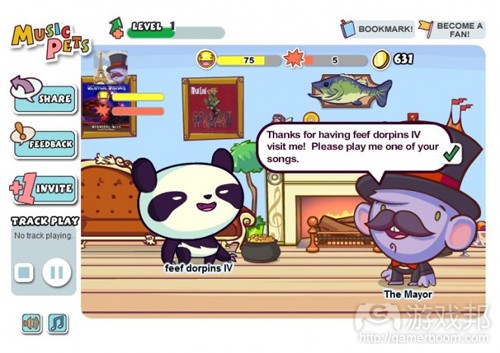
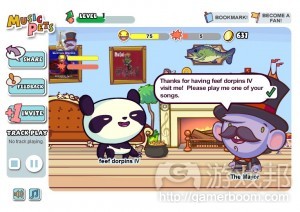
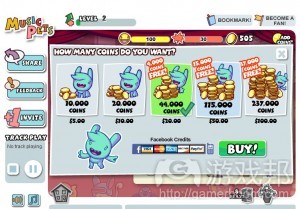
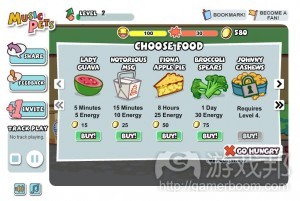

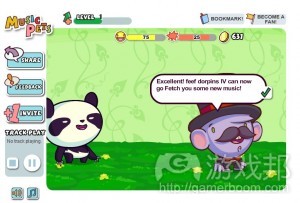
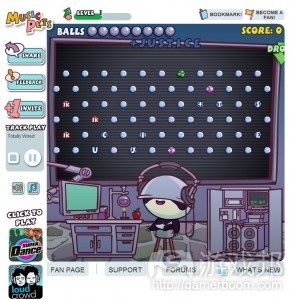
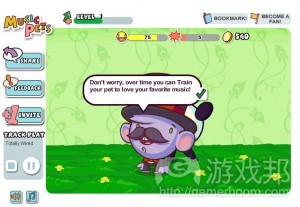
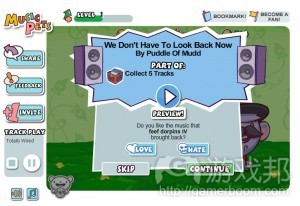
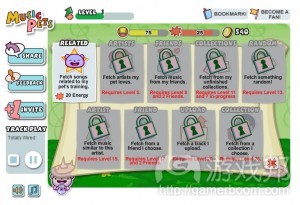


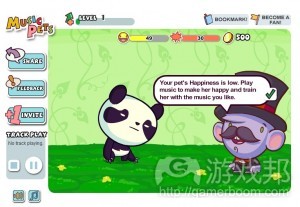














 闽公网安备35020302001549号
闽公网安备35020302001549号